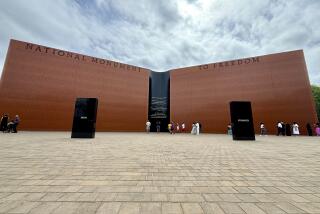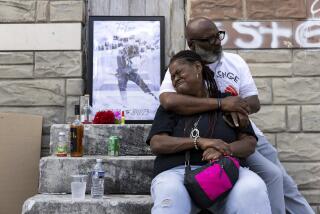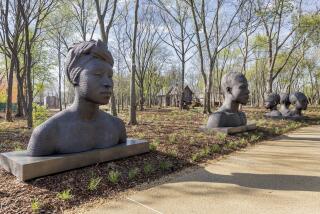Friendship forged in a Montgomery apology on display in Selma, Ala.
Kevin Murphy welled with emotion as he watched John Lewis — his newfound friend, mentor and idealistic brethren — relive one of the most painful moments of his life from half a century ago: being beaten senseless with a police nightstick as he tried to cross the Edmund Pettus Bridge in Selma, Ala.
As Lewis, then a civil rights marcher and now a U.S. congressman from Georgia, retraced his steps over the historic span on Saturday — this time clasping the hands of President Obama and First Lady Michelle Obama — Murphy cheered him on from the sidelines.
Two years ago, Murphy marked his own emotional connection to the turbulent civil rights battle — where black marchers were beaten back by white police using clubs and water hoses in another Alabama city, in another bloody faceoff.
On May 20, 1961, Lewis was one of the so-called Freedom Riders, testing the limits of African American access to public transportation in the South, when he and other marchers were attacked by a mob carrying rocks, bottles, even a pitchfork, as Montgomery police stood by.
In 2013, Murphy -- who was then the police chief of Montgomery, Ala. -- publicly apologized to Lewis for the police inaction. Murphy had yet to be born when the attack took place, but his words were heralded as a gesture of truth and reconciliation between a white law enforcement officer and a black activist.
On that March day at the First Baptist Church in Montgomery, Murphy also gave Lewis his police badge as a way to mitigate the ugly past.
It brought Lewis to tears.
The pair have since become friends, talking regularly on the phone. Lewis even invited Murphy to accompany him on a trip to Ireland to discuss U.S. race relations.
So Murphy took pride in seeing his friend chase the racist ghosts of his past.
“I just had this enormous sense of pride,” Murphy told The Los Angeles Times. “The congressman was fighting his emotions that day. It was a very significant moment for him. As he said, it’s just so amazing that 50 years after that Sunday on the bridge, he’d be a U.S. congressman standing next to the first African American president.”
Murphy’s life has also changed since the fateful public apology.
After what he calls a political dispute with the mayor, he was fired from the police department. Now, he is the assistant sheriff in Montgomery County, serving under a black sheriff, Derrick Cunningham. On Saturday, the pair drove the 50 miles from Montgomery to Selma.
A few hours later, Murphy found himself standing next to another African American official: Col. John Richardson, Alabama’s director of public safety. The pair talked about how the scene could never have taken place in the divisive 1960s.
At that moment, the apology felt just and right, as Murphy witnessed the racial progress that has been made in his state. “Here I was, a white deputy sheriff, standing next to this capable and powerful black official,” Murphy said. “It was a special moment.”
On Sunday, Murphy saw Lewis again at a gathering at the First Baptist Church, where Lewis visits every year to mark that day -- just after the attack on the Freedom Riders -- when another white mob held 1,500 blacks hostage for hours, setting cars on fire and cutting electrical lines to the church.
On this day, Lewis didn’t speak. Murphy could tell his friend was exhausted from his constant presence in the public eye.
“He looked very tired; he even got to the service a little late,” Murphy said. “I could tell he was drained. He’s been to so many events.”
At the church, several speakers made mention of Murphy’s apology -- about the progress made and the work yet to be done: Alabama is one of several states that now requires all voters to carry identification, which critics see as a move to keep blacks from casting ballots.
For Murphy, there’s also work to do. As Montgomery police chief, he started several programs to instruct white officers on the abuses of the past with black residents.
He created “Policing in a Historic City,” a seminar that examined decades-old transgressions involving race — including the 1961 Freedom Riders attack. The class, mandatory for the department’s 530 sworn officers and 200 civilians, included a lecture, slide show and tour of the local Rosa Parks Museum.
Now he plans to help launch a similar program in the Sheriff’s Department.
“We’ll do everything we can to bring people together,” he said.
Murphy will always remember that day when he crossed his own bridge, making right a wrong from the past.
“I want to apologize,” he began that day, Lewis standing by his side. “We failed to protect you and the other Freedom Riders. In 1961, Montgomery police were not very good to you. But today, we’re a better department.”
The room fell silent for several seconds. Then came a collective gasp.
Murphy’s private moment didn’t last long: Someone turned on a cellphone camera and recorded what happened next. It’s included in a documentary posted on YouTube, “The Apology Heard Around the World.”
Lewis stood and embraced the chief. “I was trying hard to hold back my tears,” Lewis said later.
He turned to sit down, but Murphy stopped him. There was something else: The chief took off his shiny badge and gave it to the veteran activist — a symbol of police oppression turned into one of reconciliation.
“Chief, you can’t do that,” Lewis said. “Don’t you need your badge?”
Murphy whispered: “I can get another one.”
Then someone stood and led the crowd in a song that was a mainstay of the civil rights movement: “We Shall Overcome.”
More to Read
Sign up for Essential California
The most important California stories and recommendations in your inbox every morning.
You may occasionally receive promotional content from the Los Angeles Times.







